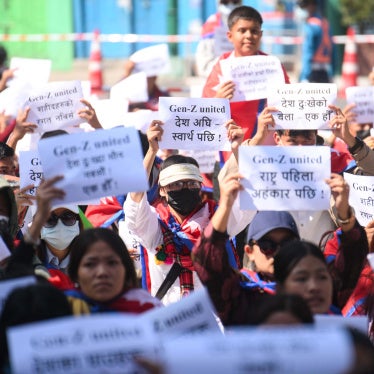(New York) -- Pervez Musharraf's military government is becoming increasingly intolerant of press freedoms in Pakistan, Human Rights Watch charged today in a letter to the Pakistani president.
In the letter, Human Rights Watch highlighted the case of Amir Mir, Senior Assistant Editor of the monthly magazine Herald, whom Musharraf reportedly threatened at a November 20 reception for Pakistani newspaper editors. Musharraf is reported to have condemned the Herald for being "anti-army" and working against the "national interest," and argued that the time had come for the Herald and Mir to be "dealt with." Musharraf's comments reportedly included specific references to stories filed by Mir for the magazine. Two days later, unidentified persons set Amir Mir's car ablaze outside his house. Mir later received a message purporting to be from the Pakistani intelligence services (ISI) claiming responsibility for the attack and warning that this was "just the beginning."
"General Musharraf should publicly disassociate himself from the comments about the Herald and order an investigation into the attack on Amir Mir's car," said Brad Adams, executive director of the Asia Division of Human Rights Watch. "Instead of creating an environment hostile to the press, it is the responsibility of the Pakistani authorities to protect journalists."
Human Rights Watch also raised the case of Rasheed Azam, a journalist and political activist from Khuzdar in Balochistan province, who was arrested on charges of sedition in August 2002 for publishing a photograph of Pakistan army personnel beating a crowd of Baloch youth. Human Rights Watch has learned that Azam was abused and tortured by members of the Pakistani military, including beatings while hung upside down and sleep deprivation. Azam remains in jail after his bail application was rejected by the district judge. His colleagues have filed a bail application in the Balochistan High Court that awaits hearing. Human Rights Watch wrote a letter to General Musharraf about Azam on October 10 this year, but to date has received no response.
Since Musharraf's 1999 coup, the Pakistani government has systematically violated the fundamental rights of members of the press corps through threats, harassment, and arbitrary arrests. Many have been detained without charge, mistreated and tortured, and otherwise denied basic due process rights. The government has sought to, and in several cases succeeded in, removing independent journalists from prominent publications. Meanwhile, the arrest of editors and reporters from local and regional newspapers on charges of sedition is becoming increasingly commonplace.
Human Rights Watch urged General Musharraf to demonstrate a commitment to genuine press freedom by releasing journalists arrested on trumped-up charges, and to bring to an end the use of coercion, intimidation and torture in his dealings with the national and regional Pakistani print media.
"It is time for General Musharraf to show the world whether he is a reformer -- or no different from other military rulers," said Adams. "How he deals with press freedoms is a big test. As of now he and his government are failing."







